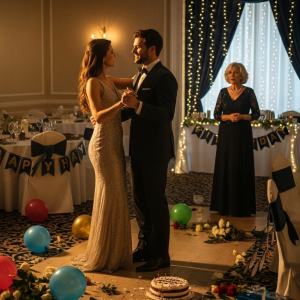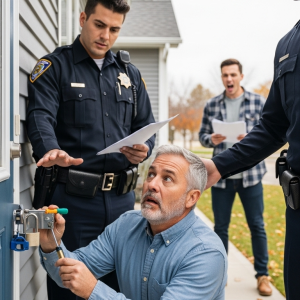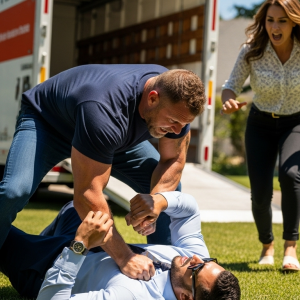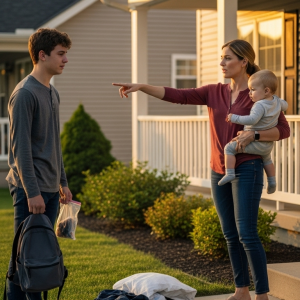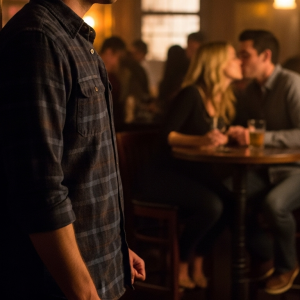My mother and sister were hosting my grandfather’s ninetieth birthday. I hadn’t seen most of these people in five years, some longer. A few, I was pretty sure I’d never met. A server handed me a plastic flute of champagne as a child ran by, holding a paper plate like a steering wheel. The scene was a collage of folding chairs, paper lanterns, and polite music humming from a Bluetooth speaker—all the ingredients for a slightly awkward, festive celebration.
It should have been fine.
And for the first hour, it was. I stood by the finger food, pretending to be fascinated by grape skewers. My husband, Roger, was beside me, holding a glass of white wine and observing the crowd with that neutral, unreadable expression he gets when he’s too polite to say he wants to leave. My mom was in her element, a whirlwind of hugs, happy tears, and reapplying lipstick behind a napkin. My dad was by the grill, complaining about the weather to anyone who would listen. And my sister, Natalie, was predictably nowhere near me, laughing at something on her phone.
It was Grandpa’s house, but it didn’t feel like his anymore. He’d built it after his business took off, a modest but proud home that my parents, my sister, and her husband now occupied. They lived there; I was just visiting. For years, every time I’d asked to come from London, the answer was always the same: It’s not a good time. He’s not feeling well. Maybe next year. Then, this spring, my mom had called. “If you really want to see him,” she’d said, “come for his birthday.”
I thought it was an opening, a softening. I booked the tickets that night.
Then they brought him out.
Everyone clapped as my mother wheeled him onto the patio. His hair was neatly brushed, and he wore a soft cashmere sweater I recognized. He smiled and waved as everyone sang. They all looked at him with such adoration. But I just stood there, frozen.
“He looks good,” Roger murmured beside me.
“Too good,” I heard myself whisper back. His face was smooth, his eyes distant, as if he were listening to a song only he could hear. I waved, a small, hesitant motion. He didn’t wave back.
“It’s the age,” I told myself, a familiar excuse. “He’s just tired.”
Roger didn’t say anything, but I saw his gaze linger. He wasn’t just looking; he was studying. His eyes flickered from the man’s face down to his hands, resting peacefully on the arms of the wheelchair. A tiny frown creased the skin between his brows.
The party continued. People gave toasts filled with vague, generic praise. I noticed my mother and sister intercepting anyone who tried to get too close, laughing and steering them away with an expert touch. “He needs his rest,” they’d say. “He gets overwhelmed.” I felt a familiar pang of being the outsider, the one kept at arm’s length.
Then, Roger leaned in close, his voice a low, urgent whisper that cut through the cheerful noise. “Sarah. Don’t make a scene. Just smile, nod, and get your bag. We’re leaving.”
My smile felt brittle. “What are you talking about? We just got here.”
He didn’t look at me. His eyes were still locked on the man in the wheelchair. “Act like nothing’s wrong,” he repeated, his hand firm on my lower back, a silent pressure guiding me toward the house.
“Roger, what is it?” I asked, my voice tight with a rising panic.
He waited until we were inside, away from the eyes and ears of the party. He stared at me, and the look in his eyes was so serious it stole the air from my lungs.
“His hands,” he said. “I’ve been watching his hands. They’re smooth, not a single scar. Your grandfather was a woodworker his entire life. His hands were a roadmap of nicks and cuts. I remember because he taught me how to whittle that summer we visited.”
My own hands went cold.
“And his ears,” Roger continued, his voice dropping even lower. “The shape of the lobe is different. I swear to God, Sarah. That is not your grandfather.”
The world tilted. My mind raced, trying to find a logical explanation, anything to fight the impossible, horrifying idea taking root in my heart. “You’re being ridiculous,” I stammered, but my voice trembled.
“Am I?” he challenged gently. “When was the last time you spoke to him? Really spoke to him, not just a shouted ‘hello’ while your mom held the phone?”
I thought back. The vague calls, the excuses, the constant gatekeeping. Three years. It had been three years.
My husband’s words hung in the air, heavy and undeniable. He took my hand. “Let’s just go.”
We walked out the front door. No one stopped us. No one even seemed to notice we were gone. We got into the rental car, and Roger immediately locked the doors. The click of the locks sounded like a final, damning verdict. We drove a few miles down the road and pulled into a deserted parking lot. The weight of what he’d said settled over us, a crushing silence.
And then, I took out my phone.
“What are you doing?” Roger asked.
“Something I should have done years ago,” I replied, my thumb shaking as I dialed the police.
I told them what I could, which wasn’t much and sounded insane even to my own ears. “I know this sounds strange, but I believe someone is impersonating my grandfather at his own birthday party. I don’t know where the real one is, and I think something is very, very wrong.”
They arrived faster than I expected. Not with sirens, but with a quiet, professional calm that was somehow more terrifying. Two plainclothes officers. They listened to my story without judgment, their faces impassive. Then, they drove to the house.
We waited. Each minute stretched into an eternity.
Finally, a call came from an unknown number. It was one of the officers. “Ma’am,” he said, his voice grave. “There’s been a voluntary statement made. The family reports that Mr. Ellis passed away in his sleep in March of 2022.”
Three years ago.
The phone slipped from my grasp. The sound of it hitting the car floor was the only thing I could hear over the roaring in my ears. He was gone. And they had all been lying.
The officer continued, his voice a distant buzz. “The man in the wheelchair is your uncle. We’re taking them in for questioning. We’d like you to come down to the station.”
The following weeks were a blur of legal proceedings and gut-wrenching revelations. The truth, when it finally unspooled, was worse than I could have imagined. My grandfather had left me everything—the house, the business assets, the trust he’d built his entire life. My mother, my father, and my sister had conspired to hide his passing, creating an elaborate fiction to maintain control of the estate. The impostor uncle was their accomplice. It wasn’t just a lie; it was fraud on a scale I couldn’t comprehend.
The story, once it broke, was consumed by the media. I became the “Billionaire Heiress Betrayed by Her Own Family.” My family became villains in a public spectacle. Their phones rang off the hook, not with friends, but with journalists. The shame was public, absolute, and of their own making.
My mother tried to reach me, leaving rambling, tearful voicemails filled with accusations and self-pity. “How could you do this to us? After everything we’ve done for you!” Her words felt like they were from a different reality, one where her betrayal was my fault.
I didn’t answer. I didn’t have to anymore.
My grandpa’s lawyer, a kind, weary man, walked me through everything. He showed me the will, the clear, unshakable handwriting. To my Sarah, it began. I’m so proud of the person you’ve become. This is to help you build a life that is fully your own. The weight of his love, a love they had tried to steal from me, was the only thing that kept me standing.
I didn’t throw them out of the house. The state did. The legal process was slow and painful, but it was thorough. They lost everything they had schemed to keep.
One night, months later, after the noise had faded and the court dates were over, I was back in London, in the quiet of my own home with Roger. My phone rang. It was my mother. I almost didn’t answer, but some lingering thread of connection made me press the button.
Her voice was different. The fury was gone, replaced by a hollow echo. “I just wanted to say…” she started, then stopped. I could hear her breathing, a shaky, uncertain sound. “He didn’t want to be a burden. That’s what he said, at the end. He didn’t want you to have to come all this way, to see him so frail. The lie… it just grew.”
I listened. I didn’t offer forgiveness. I didn’t offer comfort.
“I know,” I said finally, and it was the truth. “But you didn’t just lie about his passing. You lied about his love. You tried to erase it. You tried to erase me. And that… that has nothing to do with him.”
I ended the call. And as I turned to Roger, who was watching me with quiet understanding, I realized the truth. My grandfather had given me more than a house and a business. He had given me a final gift: the clarity to see who my family truly was, and the strength to build a new one.
The first weeks after the trial felt like walking through the ruins of an old house, one I’d lived in all my life but never truly seen. Every corner of the story had a shadow, every silence a weight. My grandfather had been gone for three years, and I had been tricked into mourning nothing, into mourning absence itself.
Reporters camped outside the house for weeks, hoping to get a glimpse of me. They called me the “Hidden Heiress,” the “Betrayed Granddaughter,” the woman whose own family had written her out of her legacy. Headlines screamed betrayal, greed, fraud. Strangers debated my life over morning coffee.
Roger did his best to shield me from the noise, but I couldn’t resist reading. Every article. Every thread. Every vile comment and every word of support. People projected their own family wounds onto mine. Some called me brave. Others called me naïve. A few insisted I must have been in on it all along.
But when I closed the laptop, the truth was quieter, heavier. My grandfather was gone. The man who had built wooden toys for me, who taught me how to sand edges smooth, who carried me on his shoulders at county fairs. He had trusted me, and I had been too far away to see his final years for what they were. That guilt clung tighter than any headline.
London became my sanctuary. My studio overlooked the Thames, and in the mornings, Roger and I would drink coffee by the window, pretending the world was small and simple. But grief has a way of following you across oceans. Some nights, I’d wake to the sound of Roger’s breathing and lie awake, staring at the ceiling, hearing my mother’s voice on that last call. The lie… it just grew.
One morning, an envelope arrived. Heavy, cream paper with a wax seal I recognized instantly: my grandfather’s lawyer. Inside was a letter, written years before his passing.
Sarah,
If you are reading this, it means you have found your way back into the truth. I know your mother. I know your sister. I have always known that they would try to keep you at a distance. Please remember: I did not forget you. I never could. Everything I built, I built with you in mind. One day, you will need strength. I hope this helps you find it.
Tears blurred the words. For the first time in months, I let myself cry—not the tight, angry tears of betrayal, but the soft, broken sobs of missing someone I loved.
The estate was more than a house. It included the woodworking shop my grandfather had kept running long after retirement, a workshop filled with sawdust, varnish, and tools older than me. The smell alone undid me when I first stepped inside. Roger squeezed my hand, silent, letting me stand there until the memories settled into something bearable.
Among the piles of wood and half-finished projects, I found a locked chest. The lawyer had given me the key. Inside were journals—dozens of them, stretching back to the seventies. His handwriting filled every page. Notes on projects. Reflections on family. Tiny sketches of furniture designs. And scattered among them, letters to me.
They weren’t mailed, never meant to be. They were more like a record of love he hadn’t been allowed to give in person. Sarah painted a birdhouse today. She has her grandmother’s eye for detail. I hope she never stops asking questions. The others call her difficult, but I call her strong.
Every word tore me apart and rebuilt me at the same time.
I decided then: I wouldn’t just inherit. I would honor.
Rebuilding the workshop became my obsession. I flew back and forth between London and the States, each time tackling more repairs. Friends thought I was crazy. “Sell it,” they said. “Start fresh.” But the smell of sawdust, the way light streamed through the high windows in the late afternoon—this was my cathedral.
Roger helped where he could, though he often stood back, watching me like he knew this was something only I could do. I sanded, polished, catalogued tools. I repaired old machines. And slowly, the shop began to breathe again.
That’s when I noticed something odd.
Behind a false wall panel, tucked neatly into a hollow beam, was another journal. Smaller, more worn than the rest. Its entries were different. Shorter. Harsher.
March 2019. They want me to change the will. Natalie came with papers. I refused.
June 2019. Your mother said I was confused. I am not confused.
December 2020. I am being erased while I am still alive.
The words trailed off months before his death. My chest tightened. He had seen it coming. He had known.
I showed the journal to the lawyer. His face hardened. “This changes things,” he said. “If we can prove they tried to coerce him…”
The legal war reignited. Depositions. Cross-examinations. My mother, red-eyed and furious across the courtroom. My sister, brittle and rehearsed, trying to paint me as the greedy one. But the journal spoke louder than either of them.
In the end, the judge didn’t just rule in my favor. He condemned them openly. Words like exploitation and manipulation filled the verdict. Watching their faces crumble should have felt like victory. Instead, it felt like ashes.
The press eventually moved on. Another scandal, another heiress, another betrayal. But the silence left in their wake was almost worse.
Natalie never spoke to me again. My father vanished to Florida with what little money he had left. My mother tried, here and there—postcards with no return address, messages left with the lawyer. I read none of them.
What I did instead was build.
The workshop became a community space. I hired apprentices, young people with nowhere else to go, teaching them the skills my grandfather had given me. We made furniture, toys, art. The sawdust smell returned, but now it mixed with laughter.
At night, when the lights dimmed and everyone went home, I’d sit at my grandfather’s old bench and run my fingers over the scars carved into the wood. Each groove was a story. A mistake, a fix, a lesson. It wasn’t perfect. It wasn’t meant to be.
Roger sat beside me one night, brushing sawdust from his sleeves. “You know,” he said, “your grandfather would be proud.”
I smiled, tired but full. “I think he already knew.”
Years passed. The betrayal faded into something like a scar—still there, but no longer raw. My family had tried to erase me, to write me out of the story. But in the end, I was the one holding the pen.
I had thought the inheritance was money, property, control. But it wasn’t. It was freedom. Freedom to tell the truth. Freedom to build something new.
And every time I walked into the workshop, smelled the sawdust, heard the hum of tools, I knew: he hadn’t just left me his legacy.
He had left me myself.
